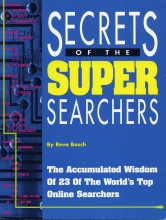
| Home News Releases | Calendar Contact |
Sources Bookshelf

Secrets of the Super Searchers
The Accumulated Wsidom of 23 of the World's Top Online Searchers
Basch, Reva
Publisher: Pemberton Press, Wilton, USAYear Published: 1993
Pages: 235pp ISBN: 0-910965-12-9
Please see our media profile in Sources:
Sources Select Resources
Secrets of the Super Searchers especially is full of insights into the zen of searching. Good researchers must be both creative and methodical. They must persevere, yet know when to quit. The single most important "secret" of these 19 women and five men seems to be an educated and disciplined intuition, acquired through experience.
Another "secret" is flexibility. According to Basch, "Veteran searchers don't believe that online is the One True Path. To the contrary, one of the hallmarks of a super searcher is knowing when not to go online. Many questions can be answered far more easily and cheaply by checking a printed reference source or picking up the telephone."
Technical tips and comments about resources are sprinkled through the text, but the emphasis is very much on research strategies. Several researchers use the "grasshopper" versus "ant" metaphor, another talks about relying on an "educated hunch" to solve a problem. One comments that "You can't dig up stuff on the Internet like a dog digging up a bone, frantically throwing dirt in every direction. You have to dig like an archaeologist -- carefully, layer by layer."
With the growth of the Internet, another issue arises: when to use the fee-based online services, and when to use the "free" Internet.
The consensus seems to be that the Internet is good for finding non-mainstream points of view and basic background information on a particular subject, especially if you are able to find one of the research-oriented or "subject hub" sites which comprise "an individual's or institution's informed opinion of the best and most useful Internet resources in a particular field." "It's like stumbling across an authoritative bibliography", as one researcher comments.
Expensive fee-based services like DIALOG and LEXIS-NEXIS are often more cost-effective than the Internet once time is factored in as a cost. An experienced user can often find precise information in response to a particular question far more quickly and reliably on the fee-based online services.
The quantity of information is also far greater: the World Wide Web has roughly 75 million pages, whereas LEXIS-NEXIS has 1 billion, and DIALOG has over 4 billion. The Internet is "a small subset, really, of the world of information", according to one researcher's comment. Another says that the problem with the Internet is that "you will find lots of stuff there, but seldom exactly what you want."
However, it can help you get there. One researcher says "it's not so much the literature you can access as it is the expertise that resides in human beings". In other words, you find enough information to formulate some good questions, and then you call up one or more of the experts or spokespersons identified as being knowledgeable in the field, and you go from there.
This point is made over and over again: "What the Net does best for me, rather than put me in touch with targeted data, it puts me in touch with targeted people who know where the particular data is."
[Reviewed by Ulli Diemer]
© Sources 2023. The information provided is copyright and may not be reproduced in any form or by any means (whether electronic, mechanical or photographic), or stored in an electronic retrieval system, without written permission of the publisher.